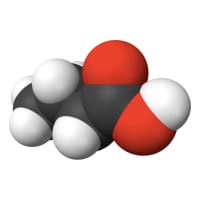Butyric acid (Butanoic acid, Butyrate) is a short chain fatty acid that is produced in the colon through microbial fermentation of dietary fiber. Butyrate is then primarily absorbed and metabolized by colonocytes and the liver for the generation of ATP (adenosine-triphosphate) during energy metabolism; however, some butyrate is absorbed in the distal colon, which is not connected to the portal vein, thereby allowing for the systemic distribution of butyrate to multiple organ systems through the circulatory system. Butyrate that has reached systemic circulation can readily cross the blood-brain barrier.
Healing Properties
Energy
Helps facilitate the homeostatic control of energy balance. (regulation of food intake versus energy expenditure).
- Butyric acid is metabolized by mitochondria, particularly in colonocytes and by the liver, to generate adenosine triphosphate (ATP) during fatty acid metabolism.
DNA Replication
Butyric acid is thought to enhance the transcriptional activity of genetic information.
